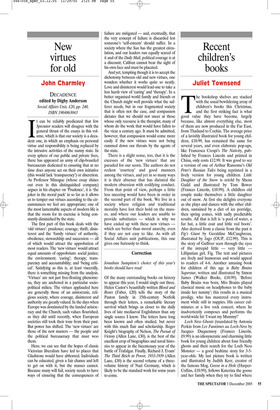New virtues for old
John Charmley
DECADENCE edited by Digby Anderson Social Affairs Unit, £20, pp. 240, ISBN 1904863043 It can be reliably predicated that few Spectator readers will disagree with the general thrust of the essays in this volume, which is that our society is a decadent one, in which an emphasis on personal virtue and responsibility is being replaced by the intrusive activities of the nanny state. In every sphere of our public and private lives, there has appeared an army of clip-boarded bureaucrats dedicated to ensuring that at no time does anyone act on their own initiative (this would lack ‘transparency’) or discretion. As Professor Minogue (whose essay shines out even in this distinguished company) argues in his chapter on ‘Prudence’, it is ‘the joker in the moral pack’ in so far as it allows us to temper our virtues according to the circumstances we feel are appropriate; one of the most lamentable aspects of modern life is that the room for its exercise is being constantly diminished by the state.
The first part of this book deals with the ‘old virtues’: prudence; courage; thrift; disinterest and the ‘family virtues’ of authority, obedience, stewardship and succession — all of which would attract the approbation of most readers. The ‘new virtues’ would attract equal amounts of opprobrium: social justice; the environment; ‘caring’; therapy; transparency and accountability; and ‘being critical’. Satisfying as this is, at least viscerally, there is something missing from the analysis. ‘Virtues’ are not just free-floating phenomena, they are anchored in a particular sociopolitical milieu. The virtues applauded here are generally those of an aristocratic, religious society, where courage, disinterest and authority are greatly valued. In the days when Europe was dominated by the landed aristocracy and the Church, such values flourished, as they did until recently, when European societies still took their tone from their past. But power has shifted. The ‘new virtues’ are those of the new masters — the people and the political bureaucracy that must woo them.
Here, we can see that the hopes of classic Victorian liberalism have led to places that Gladstone would have abhorred. Individuals can be educated, given a fair chance and left to get on with it, but the masses cannot. Because many will fail, society needs to have ways of ensuring that the consequences of failure are mitigated — and, eventually, that the very concept of failure is discarded lest someone’s ‘self-esteem’ should suffer. In a society where the Sun has the greatest circulation, and our leaders run equally scared of it and of the Daily Mail, political courage is at a discount; Caliban cannot bear the sight of his own face and must be placated.
And yet, tempting though it is to accept the dichotomy between old and new virtues, one wonders whether it works quite so neatly. Love and disinterest would lead one to take a less harsh view of ‘caring’ and ‘therapy’. In a better organised world family and friends or the Church might well provide what the sufferer needs, but in our fragmented society that is often not the case, and compassion dictates that we should not sneer at those whose only recourse is the therapist, many of whom do the work that would have fallen to the vicar a century ago. It must be admitted, however, that compassion would come more easily if the new virtues were not being rammed down our throats by the agents of the state.
There is a slight sense, too, that it is the excesses of the ‘new virtues’ that are paraded for our scorn. The authors do not reckon ‘courtesy’ and good manners among the virtues, and yet in so many ways it is their absence that has dictated the modern obsession with codifying conduct. From that point of view, perhaps a little less sneering would have been in order in the second part of the book. We live in a society where religion and traditional morality have lost their hold on the masses, and where our leaders are unable to provide substitutes — which is why we have ended up with these new virtues which are better than moral anarchy, even if they are not easy to like. As with all Social Affairs unit publications, this one gives one furiously to think.



























































 Previous page
Previous page